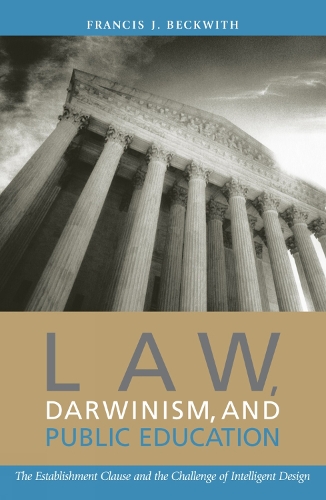
Law, Darwinism, and Public Education: The Establishment Clause and the Challenge of Intelligent Design
(Paperback)
Publishing Details
Law, Darwinism, and Public Education: The Establishment Clause and the Challenge of Intelligent Design
By (Author) Francis J. Beckwith
Bloomsbury Publishing PLC
Rowman & Littlefield Publishers
24th December 2002
United States
Classifications
Tertiary Education
Non Fiction
Social law and Medical law
344.730796
Physical Properties
Paperback
224
Width 146mm, Height 230mm, Spine 14mm
304g
Description
Francis J. Beckwith asks whether teaching Intelligent Design in public schools would be constitutional, in light of the Supreme Court's decision in Edwards v. Aguillard.
Reviews
Francis Beckwith's judicious, important book deserves a wide audience. * National Review *
I am not persuaded by the arguments for intelligent design theory as an alternative to Darwinian biology. But I am persuaded by Beckwith's book that introducing such arguments into public school science classes would not be unconstitutional. He shows how allowing students to study the debate between intelligent design explanations and scientific naturalism could promote the freedom of thought favored by the American constitutional framers. -- Larry Arnhart, Northern Illinois University
Beckwith's book is not only comprehensive and up-to-date, but it clearly explains both sides of the debate over how the origins issue should be presented in public schools. It should be required reading for anyone who makes science education policy. -- David DeWolf, Gonzaga University Law School
Beckwith's book should be required reading for anyone who wants to understand the fundamental legal issues in the 'creation versus evolution' debate. -- Robert Kaita, Plasma Physics Laboratory, Princeton University
Beckwith makes a compelling case that Intelligent Design is not the same as animal creationism. Beckwith persuasively argues that presentation of Intelligent Design in public schools would not impermissibly 'establish' religion. * The Harvard Law Review *
Frank Beckwith's gift for restating difficult legal problems in straightforward and understandable terms will prove deeply influential as the debate over intelligent design shifts to the courts. -- William A. Dembski, author of No Free Lunch: Why Specified Complexity Cannot Be Purchased without Intelligence
Suffice it to say that [Beckwith's] case is extremely thorough and abundantly documented (although not intimidating to readers lacking extensive knowledge in this area). Law, Darwinism, and Public Education is both a winsome defense of ID as legitimate science and a practical manual for writing and defending laws for the introduction of ID into public school curricula. When the history of the ID movement is written, this book may be esteemed as one of ID's most important and decisive strategic assets. But whatever its historical fate, it is an appropriate text for courses in public policy, apologetics, philosophy of religion, and philosophy of science. All those interested in ID should put it at the top of their 'must-read' list. * Philosophia Christi *
Author Bio
Francis J. Beckwith is currently a James Madison Fellow in Constitutional Studies & Political Thought, Princeton University. He is also a fellow at the Center for the Renewal of Science and Culture at the Discovery Institute in Seattle and a research fellow at the Newport Institute for Ethics, Law, and Public Policy in California. His books include Do the Right Thing (2002), Abortion and the Sanctity of Human Life (2000) and The Abortion Controversy 25 Years After Roe v. Wade (1998).
